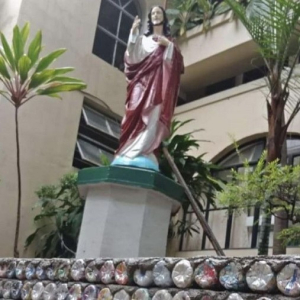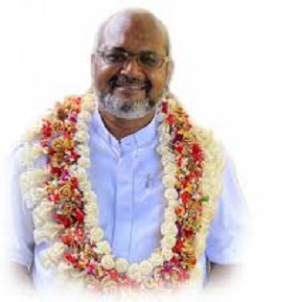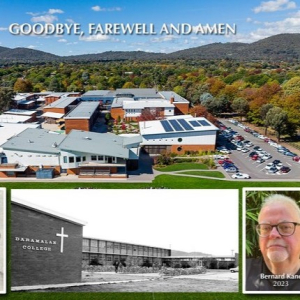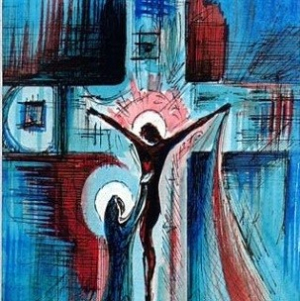Peter MALONE
“Ecobricks”? Ask MSC Philippines
“Ecobricks”? Ask MSC Philippines
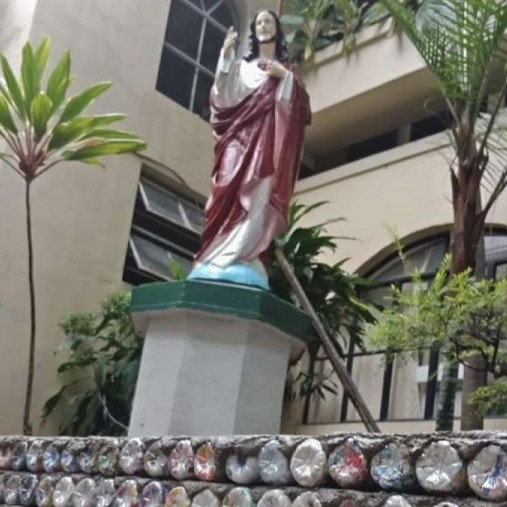
Plastic bottles stuffed with plastic, called "ecobricks," are visible everywhere at the seminary campus of the Missionaries of Sacred Heart, in Manila, Philippines, including in walls, planter boxes, garden fencing and altar decorations. (Courtesy of Missionaries of the Sacred Heart)
Rector of the seminary from 2018 to 2023, Espuerta, 53, for years led classes of seminarians in making the ecobricks.
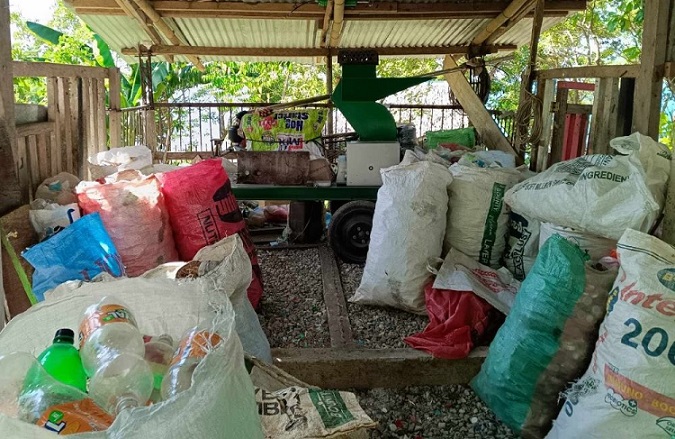
Each brick starts with an empty 1.5-liter plastic bottle, then other plastics are cut into smaller pieces and pressed into the bottle with a bamboo stick. All plastics are cleaned first and sometimes painted for a more artistic look. The process can be time-consuming, with a single brick sometimes taking as long as one day to make.
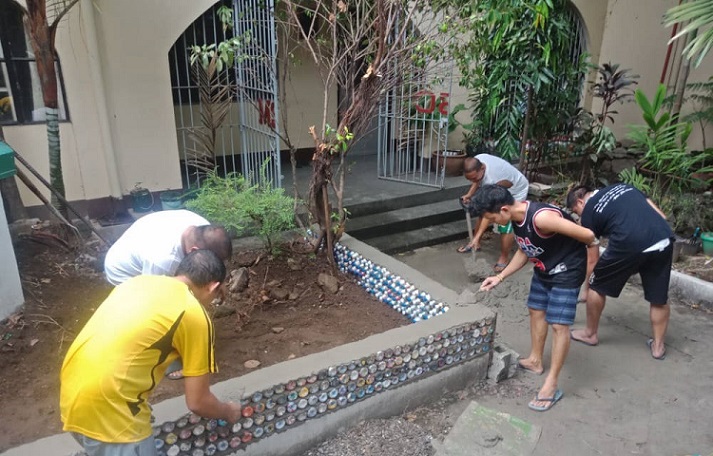
Missionaries of the Sacred Heart in Manila use discarded plastic to create ecobricks. Plastic bottles are stuffed with plastic pieces to be used as building materials. (Courtesy of Missionaries of the Sacred Heart)
The Missionaries often use finished ecobricks and cement to build planter boxes around trees, barrier fences for gardens, and the bases of outdoor concrete tables and chairs. Inside their church, they have formed stands for flowers in front of the altar as well as a manger for a nativity scene.
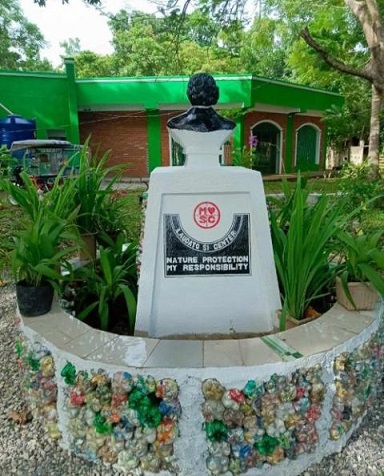
The Missionaries' ecobricks program is part of their efforts under the Sowing Hope for the Planet campaign promoting ecologically sustainable actions among congregations and orders of women and men religious around the world. The Philippine order is also enrolled in the Laudato Si' Action Platform, a Vatican initiative where Catholic institutions create seven-year sustainability plans in the spirit of Francis' 2015 encyclical "Laudato Si', on Care for Our Common Home."
"Human beings are not the only residents in the world. We also have our brother creatures, and we have to take care of them," Espuerta said. "Being responsible for the use of the plastic could be a good way to save our environment."
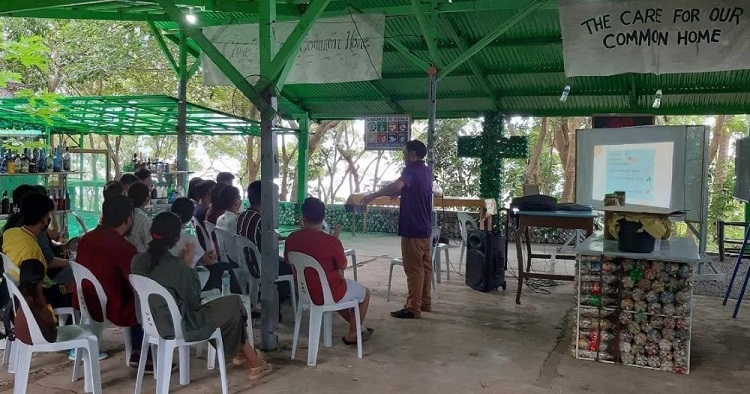
Priests with the Missionaries of the Sacred Heart lead trainings on how to construct ecobricks at their 15 parishes in the Philippines. The program is part of their order's creation care initiatives in the spirit of Pope Francis' encyclical "Laudato Si'." (Courtesy of Missionaries of the Sacred Heart)
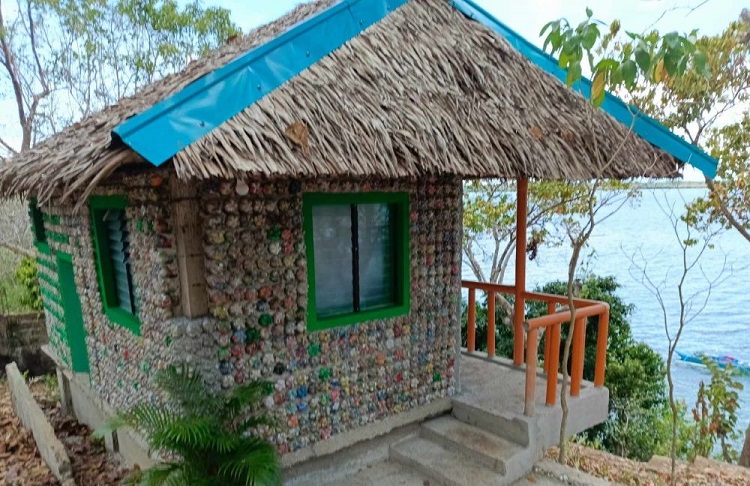
At Santo Nino Parish, Camotes Island in Cebu, Philippines, parishioners used ecobricks to construct a chapel. (Courtesy of Missionaries of the Sacred Heart)
And supporting this caring for the earth project, Superior General, Abzalon.
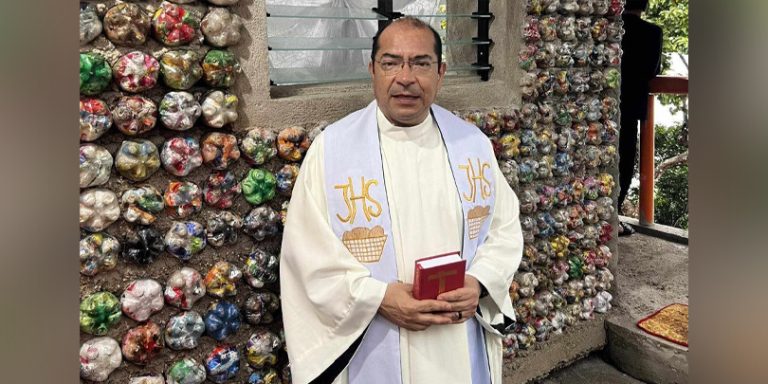
Further information
At the seminary for the Missionaries of the Sacred Heart in Manila, thousands of plastic bottles can be found everywhere – repurposed into “ecobricks” used for projects around the grounds. Source: NCR Online.
Beyond construction, the novel bottle-bricks serve as ubiquitous reminders of the prevalence of plastics in the world and the efforts to reject the throwaway culture that Pope Francis regularly condemns.
“We have to care for our common home. And plastics destroy creation,” said Missionary of the Sacred Heart Fr James Espuerta.
Rector of the seminary from 2018 to 2023, Fr Espuerta, 53, for years led classes of seminarians in making the ecobricks.
Each brick starts with an empty 1.5-litre plastic bottle, then other plastics are cut into smaller pieces and pressed into the bottle with a bamboo stick. All plastics are cleaned first and sometimes painted for a more artistic look. The process can be time-consuming, with a single brick sometimes taking as long as one day to make.
The Missionaries often use finished ecobricks and cement to build planter boxes around trees, barrier fences for gardens, and the bases of outdoor concrete tables and chairs. Inside their church, they have formed stands for flowers in front of the altar as well as a manger for a nativity scene.
The Missionaries’ ecobricks program is part of their efforts under the Sowing Hope for the Planet campaign promoting ecologically sustainable actions among congregations and orders of women and men religious around the world. The Philippine order is also enrolled in the Laudato Si’ Action Platform, a Vatican initiative where Catholic institutions create seven-year sustainability plans in the spirit of Francis’ 2015 encyclical Laudato Si’, on Care for Our Common Home.
“Human beings are not the only residents in the world. We also have our brother creatures, and we have to take care of them,” Fr Espuerta said. “Being responsible for the use of the plastic could be a good way to save our environment.”
Vatican appointment, Simon Mani MSC, Bishop of Tarawa and Nauru
Vatican appointment, Simon Mani MSC, Bishop of Tarawa and Nauru

Vatican City (Agenzia Fides) - The Holy Father has appointed the Reverend Father Simon Mani, M.S.C., until now rector of the Pacific Regional Seminary of Suva.
Msgr. Simone Mani, M.S.C., was born on 27 March 1969 in Labasa, on the island of Vanua Levu, Fiji. He studied philosophy at the Pacific Regional Seminary, for the religious congregation of Missionaries of the Sacred Heart.
He made his religious vows in 1991, and was ordained a priest on 30 November 1996.
He has held the following offices: deputy parish priest of Saint Agnes, Suva (1997), teacher at the M.S.C. Professional Institute for disadvantaged youth – Chevalier Training Center (1998), parish priest of Saint Agnes (1999-2004), M.S.C. provincial bursar for the Pacific (2003-2005), M.S.C. provincial superior (2005-2015), director of the Chevalier Training Center (2015-2018), and rector of the Pacific Regional Seminary of Suva (since 2018).
We congratulate Simon, a friend of the Australian Province.

Daramalan alumni stories, Bernard Kane, ‘Goodbye, farewell and amen.”
Daramalan alumni stories, Bernard Kane, ‘Goodbye, farewell and amen.”
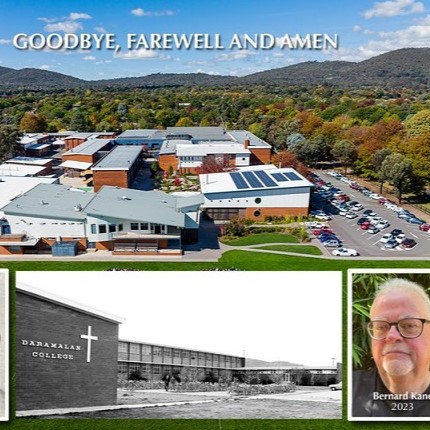
For many years, Daramalan student and Daramalan staff, posted interesting and entertaining posts on the achievements of college alumni. Last year, he passed on the task and posted this entry. It is also a mini-memoir and of the College.
Bernard worked with Jim Littleton for photos for many of his books,
In coming weeks we will continue the Daramalan alumni stories.
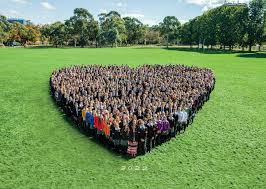
I’m writing to say goodbye. After 20 years, I’m finishing in this role. The school has employed another person who will take on the Alumni baton, so I would not only like to take this final opportunity to pass on my thanks to everyone who has made our group what it is today, but to also ask for your indulgence while I bore you with a short history of, well…me.
Since Daramalan opened in 1962 there have been sporadic attempts to maintain links with our ex-students but it wasn’t until 2002, during the College’s 40th anniversary, that the Principal at the time David Garratt realised the need for a more formal organisation. Which is where I came in.
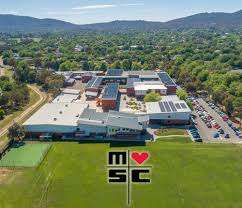
I started at Daramalan in 1964 in 4th Class, graduating after 9 years in 1972. Soon after, I left Canberra returning some 25 years later when I reconnected with the College at the request of Principal Frank Fulton in 2001 who asked if I would work with the aforementioned anniversary committee. Sadly Frank passed away just two weeks after the 40th event.
Around this same time the Hospitality Department at the College also opened a commercial Restaurant in the Dickson shops called ‘Pathways’ which was designed to give our students real-world experience in the hospitality industry. An admirable concept, but for many reasons, it was not to be an economic success. The Bursar at the time, Fr Harold Baker, asked me to take on the management of ‘Pathways’ and submit a report with a recommendation as to its long-term viability. Reluctantly, after six months, it was time to close it.
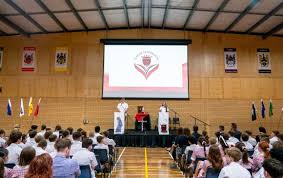
It was then Dave Garratt asked me if I would be interested in working at Dara to create an official Alumni Association, as by that time, some 14,000 ex-students had passed through the school gates and many were actively seeking to stay connected. I readily agreed and, as they say, the rest is history.
A lot has changed at Dara since I arrived nearly 60 years ago. We now have girls, but sadly no priests or brothers teaching. Back then, the College comprised three buildings for 700 boys; we now have eleven (soon to be twelve) with co-ed enrolments approaching 1500 this year. (The first girls arrived in 1977).
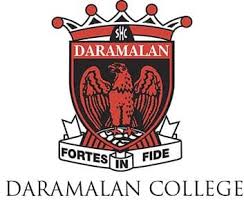
In 1964 the school was led by Fr McCowage; in 2023, our second female lay Principal Rachel Davies is at the helm after Rita Daniels retired in 2020. We have been lucky to have had so many memorable teachers over this time, far too many to mention, as we all have our favourites depending on personalities and generation.
Finally it would be remiss of me not to acknowledge some individuals such as Fr Jim Littleton, Fr Bob Irwin and Fr Harold Baker who helped make the MSC ethos at Daramalan the cornerstone of what the College stands for today. Thank you.
Anyway I think that’s probably enough from me. Thank you again to everyone for your support and commitment to our Alumni over the years, and to ‘borrow’ the title of the final episode of M*A*S*H, Goodbye, Farewell and Amen.
Bernard Kane
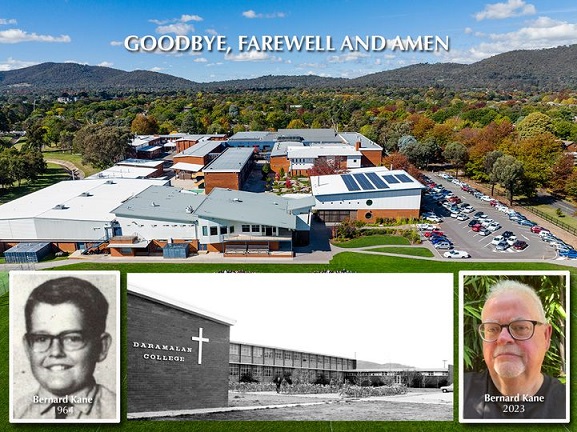
Some Significant May Days for the Chevalier Family, 2024
Some Significant May Days for the Chevalier Family, 2024
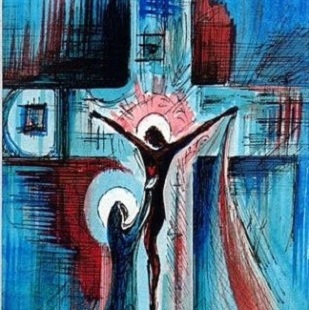
NOTE:
this is an amplified version of Significant Days, combining the list made originally by Cor Novum, Issoudun, now with the addition of dates from Father Jan Bovenmars MSC’s book, Jules Chevalier, Daily Readings. His book was published in 1993 – so, more recent just from all around the congregation and the Chevalier family would be most welcome.
22 new Significant Days have been added.
May, an Our Lady of the Sacred Heart month.
A reminder, May 6th, that the Church of Our Lady of the Sacred Heart in Randwick was opened in 1888, only a few years after the arrival of the first MSC in Sydney. The parish in those days extended to Botany.
1 May, 1863
An article on Our Lady of the Sacred Heart appears in the Jesuit publication, "Messager du Sacré-Coeur", founded by Fr. Henri Ramière, SJ. It is the first presentation of this new title for Mary.
1 May, 1883
Canonical erection of three MSC communities in Peru: Lima (Seminiario Nuestra Senora del Sagrado Corazon), Acari, and Puquio.
2 May, 1864
An article on Our Lady of the Sacred Heart appears in the “Annals de Saint Sacrament” (May 1864).
2 May, 1950

Father Harry Reid MSC (AUS), arrives in Japan to set up a mission in conjunction with Father Archibald Bryson MSC, Army Chaplain.
3 May 1928
Mother Liboria Loeper, Provincial of the American Province MSC Sisters, arrived in Sydney to begin an Australian foundation that would be of support to the established Mission in Papua New Guinea.
4 May, 1923
The Vicariate of the Marshall Islands is united with the Vicariate of the Caroline Islands and the Marianas, and is entrusted to the Society of Jesus. The German MSC had to leave the Marshall Islands in 1919.
4 May, 1965
First canonical erection of an MSC House in the Dominican Republic at San Jose de las Matas, Santiago, Castillo.
5 May, 1894
Erection of the “the Northern Province” of the MSC (Holland, Belgium, and Germany-Austria). It has three houses: in Borgerhaut-Antwerp, Belgium, Tilburg, Holland, and Salzburg-Liefering, Austria.
6 May, 1876
Watertown, New York, arrival of Father Durin, superior of the new community, with two scholastics.
6 May, 1883
The shrine of Our Lady of the Sacred Heart at Sittard, Netherlands is elevated to a Basilica by Pope Leo XIII. Today, it is the National Shrine of Our Lady of the Sacred Heart in the Netherlands.
6 May, 1888

In Randwick, Australia, the church built by Father Michael Tierney, is dedicated to Our Lady of the Sacred Heart. Today, it is the National Shrine of Our Lady of the Sacred Heart in Australia.
7 May, 1892
On his way to Yule Island to Europe, Bishop Verius arrives in Sydney. His confreres receive him well – and sending right away to the tailor and the barber.
10 May, 1887
The first team of missionaries leaves France for Quito, Ecuador, under the guidance of Father Morisseau, general assistant.
10 May, 1888
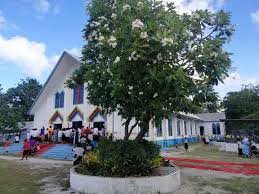
Sacred Heart Cathedral
The first MSC Fathers Edouard Bontemps and Joseph Leray, and Brother Conrad Weber arrive in Kiribati! Fr. Leray would later become the first Bishop of Gilbert Islands.
10 May, 1889
Erection of the Vicariate of New Pomerania (Rabaul, PNG), entrusted to the MSC. Father Henry Verius is appointed as its first Vicar, soon afterwards replaced by Father Louis Coupe.
12 May, 1931
Father Eugène Meyer dies in Issoudun. He was the Superior General of the MSC from 1905 to 1920, the second after Father Jules Chevalier.
12 May, 1991
Ambrose Kiapseni MSC is ordained first PNG Bishop of Kavieng.
14 May, 1926
Father Pierre-Marie Tréand, founder and first Provincial of the Australian MSC Province, dies this day.
17 May, 1977
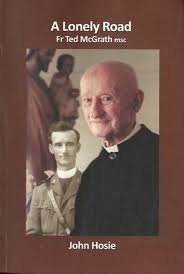
Death of Father Timothy McGrath MSC (Australia) who worked with Eileen O’Connor, in the founding of Our Lady’s Nurses for the Poor.
18 May, 1856
Still early days of the MSC foundation. Father Charles Piperon joins the budding community of the Missionaries of the Sacred Heart, in Issoudun. Two days later, the Archbishop of Bourges appoints him as Prison Chaplain at Issoudun.
21 May 1928.
At Station Pier, Melbourne, she welcomed Srs Eulalia, Aquilina, Maurilia, Zaccharia, and Margareta. Their first destination was Rupertswood, Sunbury where they provided practical support to the Salesians.
21 May, 1899
First vows of Brother Robert South, first brother of the Australian Province.
21 May, 1910
The four houses in the United States (Watertown, Natick, Casanovia, Onowa) are united into a Quasi-Province.
22 May, 1839
Jules Chevalier is 15 years old. On this day, he received the sacrament of Confirmation at Richelieu. He received his First Holy Communion three years earlier on 29 May, 1836, again in Richelieu.
23 May, 1879
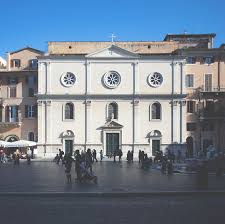
Blessing of the church of OLSH at Piazza Navona by the Cardinal Vicar of Rome.
23 May, 1970
The MSC Section in Rio De Janeiro, started by the Dutch Province in 1946, becomes a Region.
24 May, 1886
First Australian OLSH postulant: Sister Margaret Mary Sweeney.
24 May, 1911
Arrival of the first two MSC in Brazil from Holland.
24 May, 1912
The first MSC houses in England and Ireland are united into “the Section of the British Isles”.
26 May, 1860
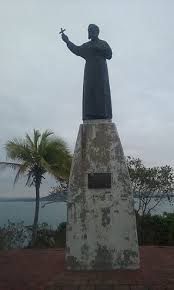
Henri Verjus is born in Oleggio, in Italy.
30 May, 1945
Father L.Beeckman MSC (Belgium) returns home from the Dachau concentration camp.
31 May, 1865
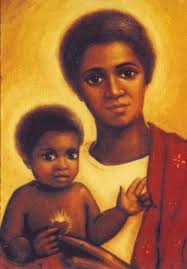
The feast of Our Lady of the Sacred Heart is publicly celebrated for the first time. By 1872 the feast is celebrated worldwide in 950 churches or chapels. For quite some time, this feast was held on this date, but today, globally, the feast is observed on the last Saturday in May.
31 May, 1868
The number of members of the Confraternity of OLSH reaches 2 million.
31 May, 1919
The first six postulants into the new Papuan Congregation of the Handmaids of the Lord at Kabuna.
Scoop/ 2024
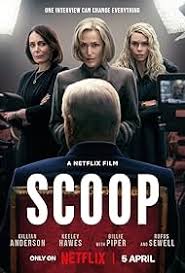
SCOOP
UK, 2024, 102 minutes, Colour.
Gillian Anderson, Rufus Sewell, Keeley Hawes, Billie Piper, Romola Garia, Amanda Redmond, Conor Swindells, Jordan Kouame, Richard Goulding, Alex Waldmann.
Directed by Philip Martin.
Pre-review comment about words and changing meanings. Perhaps we think of scoop in connection with ice cream. One definition of the word is: a utensil resembling a spoon, with a short handle and a deep bowl, used for removing dry or semi-solid substances from a container. But, for quite some time, Evelyn Waugh used it for the title of his 1938 novel, scoop as: a piece of news published by a newspaper or broadcast by a television or radio station in advance of its rivals.
Many will remember the 2019 BBC interview with Prince Andrew and his connection with sexual predator, Jeffrey Epstein, criticisms of his behaviour and friendship, photos of the two, public interest especially at the time of Epstein suicide in jail. And, there are accusations against Prince Andrew. The Prince, and the Palace, agreed that he could be interviewed on the prime BBC program, Newsnight. It was meant to be a vindication of Prince Andrew. He spoke confidently but the consequences were disastrous leading to his retiring from royal functions and losing his honours.
This is a very interesting look at the background of getting this interview to air. It is a focus on Prince Andrew himself and not any analysis of Jeffrey Epstein. There have been many documentaries on this subject. Rather, the initial focus is on the brashly self-confident producer, Sam McAlister (Billie Piper), working outside expect to norms and procedures, taking initiatives to the sometimes disapproval of her colleagues. She had connections, was alert to opportunities, to meetings, phone calls, conversations. And we see in some detail how she was able to persuade Prince Andrew’s staff, especially his very loyal assistant, Amanda Thirsk (Keeley Hawes) as well as the BBC authorities.
The decision was that skilled interviewer, Emily Maitlis (Gillian Anderson) would front the interview. She is presented as confidently idiosyncratic. But she prepares, works carefully on the questions, and we see in some detail sections of the interview, her timing, her probing, and Prince Andrew (Rufus Sewell looking very much like the Prince) offering his answers. Pleased at the end of the interview.
However, the public response was very negative, the public not believing his comments about Epstein and his friendship, staying with Epstein in New York, the accusations of the young woman against him, and his remembering taking his children for a pizza, his comments that he did not sweat at the time…
While this is an interesting film with a perspective on members of the British Royal family, it is very much a film about the media, enthusiastic and enterprising producers, BBC politics, procedures and protocols, astute interviewers, and the power of television and public opinion.
- The title, the world of media, scoops, significant stories, sensational stories, investigations, public exposure?
- The film based on actual characters and events? Audience awareness of the characters, of the events? Jeffrey Epstein and his sexual abuse? Ghislaine Maxwell? Prince Andrew?
- The focus on the interview with Prince Andrew? The film not trying to explore Jeffrey Epstein and his career crimes, suicide? The situation for Prince Andrew, the arrests of Jeffrey Epstein, his suicide? The photo from 2010 in the park? The situation for the media, for Buckingham Palace, for an interview, Prince Andrew and the media, the world understanding him? The backfire?
- The film’s commentary on the media, the BBC and its aims, serious, wider audiences? The press, television, photojournalists – and the opening with the journalists trying to photograph Jeffrey Epstein, his house, people coming in and out, the young women over the years, Prince Andrew, the pursuit in the park, getting the best position, successfully getting the photo? Its being published? The effect on the Royal family, Prince Andrew, his staff?
- The portrait of Prince Andrew, reversals performance, made up like the Prince? His mannerisms, way of speech? An opportunity for the audience to see Prince Andrew and understand him better – or worse? His staff, Amanda and her long devotion, admiration for the prince, his reliance on her but seeming not to notice? Employing the press agent, the discussions about his appearance on television, the scenes of his public work and charity? People not attending? The suicide, the pressure on the Prince? His consciousness of his mother? Memories of his mother coming his hair in the past? The decision to go on television, the meeting with Emily Maitless and Sam McAllister, the presence of the Princess Beatrice, her frank comments about her father and reputation? His agreement for the television interview?
- Sam McAllister, the film based on her book, her role as producer, determined, the background of her mother encouraging her, her son and his girlfriend, and her care for him? The role of the BBC, the prospect of sackings? Her way of producing, going out, the criticisms from the other members, the contact with Amanda, at the palace, going out for a drink, the issue of Jeffrey Epstein, her discovering more, Prince Andrew, with Emily meatless and the other produces? Her not being included, her mother’s advice, going forward? Involved? Her continued presence?
- The BBC, the program, Newsnight, Emily Maitlis and her reputation, personality, dog, the walk in the park, changing attitudes towards Sam? The meeting with the prince, the decisions, the BBC officials, the Director at the Opera, the go-ahead? Her preparation, the staff in discussions about the questions, the device of having her ask the staff the question and testing it, the Prince and sharing answers to his staff? Raising the issues? The protocols, the table, the room, distance apart, what to wear?
- The probing of the issues, Jeffrey Epstein himself, his way of life, the island, mansions, the girls, the trafficking? The encounter with Prince Andrew? The Bill Clinton references and Emily Maitlis angry at Monica Lewinsky’s treatment and misogyny? Mention of Trump? The arrest, the case, imprisonment? Ghislaine Maxwell and the princes friendship? The contacts, the parties, the dinners, 2010, the Prince staying at the house, breaking ties? The photo of the Prince, Virginia Jgiuffre and her testimony, the Prince and his memory and denials?
- The actual interview, based on the real interview, the audience getting the chance to see Emily Maitlis, thinking, probing, questions, giving the Prince space to speak as Sam recommended? The responses of the as one, confident, hesitations, excuses, the issue of the dates, the pizza, his daughters, the sweating? His satisfaction with the interview? And the palace?
- The preparations, the promotions, the night itself? The audience? The immediate responses, online responses, the condemnations of the Prince?
- The reaction of the palace, the Queen, his being relieved of his duties?
- The film and the probing of the Jeffrey Epstein case, abuse, victims, the final comments?
- The film and the Royal family, problems, public relations?
- The film as illustrating the role of the media, journalists, producers, scoops and ratings, reputations?
Fremont
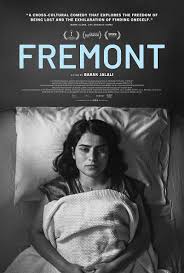
FREMONT
US, 2023, 91 minutes, Black-and-white.
Anaita Wali Zada, Greg Turkington, Jeremy Allen White, Hilda Schmelling, Siddique Ahmed.
Directed by Babajk Jalili.
Anyone who has visited San Francisco may remember the BART, Bay Area Rapid Transit, and the name, Fremont, to the south of the city. And this is where this film is located.
In fact, most of the film stays within the confines of Fremont but, at the end, it ventures out into the California deserts. And the filmmakers have opted for black-and-white photography.
A lot of the action takes place in a Fortune Cookie factory, handmade cookies, the staff inventing the wise sayings inside. This is where Donya (Anaita Wali Zada) works, a good friend in her co-worker, on good terms with the cheerful manager (but not so much with his wife), going home to her apartment, but stopping on the way for a diner meal, friendly with the manager as they watch television together. A quiet life.
But, Donya is a refugee from Afghanistan, a translator working with the Americans, getting out of the country, her family still there, something of a lonely figure but a strong figure. Which means that she is a challenge to Americans (and to citizens of any country where Afghans have fled to escape the Taleban), trying to find a new place to settle, memories of the past, the challenge to her identity. And she finds it very difficult to sleep.
She wants some sleeping pills and has a consultation visit with the psychologist. We find it very interesting to see her approach, her determination, the personality of the psychologist, his ways of dealing with his clients – and his promotion of Jack London’s White Dog as a symbol for their situations.
When the elderly writer of the sayings collapses at work, Donya is given the job. And she decides to include a phone number in one of the fortune cookie’s and to wait and see what happens.
She does get a reply and she decides to go out to visit the person who replied who tells her about a deer for her. There are some unexpectedly comic touches when she arrives – and receives a literal statue of a deer. But she stops at a garage on the way, her car needing some attention. She meets the quiet mechanic (Jeremy Allen White), goes to a diner and he follows, some conversation, and she then drives on.
But, she returns. He is very quiet. As an intense look. It affects her. And we are left with Donya out there in the desert, the weight of her life in Afghanistan, the months in the United States, her wondering and our wondering what her future will be.
- The value of small budget-independent films? Quality filmmaking? Opportunities for filmmakers and performers? Exploration of social issues? Distribution and challenge?
- The title, the Bay Area of San Francisco, the suburb, the confined view, the factory, apartments, the travel into the California countryside, the small towns, diner, garage? A particular world? In black and white?
- The background of Afghanistan, from the 19th century and occupations, Russia in the 20th century, the Taliban, 9/11, the Americans, international troops, occupation, progress, the retreat of American forces, the coming of the Taliban, rigid rule, suppression of women, sharia law, many fleeing, the deaths?
- The reality and symbolism of the Fortune Cookie factory, the texts being composed in the factory, the personal wrapping?
- Donya and her story, the initial impact, seeing her at work with the fortune cookies, conversations with Joanna, the Chinese owners, the old lady and her death, a cheery husband, the severe wife? A context for looking at Donya, her apartment, unable to sleep, conversations with the neighbour, taking his appointment at the psychiatrist, the receptionist, the doctor, her insistence?
- The revelation of her story, family, as a translator for the Americans, a desk job, supplying information and technical translations? Her family thinking her a traitor? Her being able to escape from Afghanistan, other translators and their deaths?
- Her finding herself in Fremont, eight months, the memories of the past, unable to sleep? Friends with her neighbours? Conversations with Joanna, her promotion to writing the fortune cookie sayings? Her skills, putting the message and a phone number, Joanna phoning her, the reply, seeming authentic, the signature with the Deer? Donya and her deciding to go to meet the man, a literal deer statue for the shop? Her reaction?
- The meals, at the diner, the owner, the conversations, watching the television together?
- The sessions with the psychiatrist, his initial reluctance, his explanations, her return, laconic, giving the information, filling in her background? His responses? Her wanting sleeping pills? His use of the novel, White Dog, reading of the passage, his being moved, the parallels of the part wolf, outsider, finding a place? The effects of the therapy?
- The drive, the oil in the car, the mechanic, his offering to help, a loner, his explanation himself, being alone, wanting to talk, the diner, offering the coffee, her return, the cup of coffee, the quiet attraction? Her leaving, getting the deer, the return, giving the mechanic the deer, the next cup of coffee? And Donya’s future?
- An opportunity in the 2020s to reflect on the plight of Afghanistan, the rule of the Taliban, the many migrants fleeing Afghanistan, the countries receiving them, welcome or not, adapting, future?
Lesson, The

THE LESSON
UK, 2023, 104 minutes, Colour.
Richard E.Grant, Julie Delpy, Daryl McCormack, Stephen McMillan, Crispin Letts.
Directed by Alice Troughton.
There are certainly lessons in this drama but they are not the core. Rather, the characters involved are those who have to learn lessons – and do.
This is a British film, but set in the world of literature, creative writing, the screenplay divided into chapters. There is a prologue where a young man, Liam, Daryl McCormack (Good Luck to You, Leo Grande) is being interviewed about his writing – and, this will be reprised in the epilogue, the tentatively having become the self-confidently.
Liam is talented, gets the opportunity to go to a large country estate owned by the celebrated writer, Sinclair (Richard E.Grant), successful, seen being interviewed, ultrasensitive, walking out, certainly a man of moods. At home is his French wife, Helene (Julie Delpy). She is supportive of her husband, and businesslike. But they have hired Liam as a tutor for their teenage son, Bertie (Stephen McMillan), somewhat erratic in his studies but being pressurised by his father for forthcoming exams and qualifications.
For a while, the audience will be with Liam, intrigued by the family situation, memories of a talented dead son who committed suicide in the mansion pool, Sinclair writing into the early hours of the morning, the seeming detachment of Helene, and a butler who is the essence of formality.
But, we become more and more antagonistic towards Sinclair, his whims, self-importance, ambiguous relationship with his wife, as well as mixed responses to Bertie and his studies, his writing, the ups and downs of his interactions with Liam.
Then, there is a surprise when Sinclair seems to be very friendly with Liam, even inviting him to read his latest manuscript. Liam invited to show his own manuscript to Sinclair. The results are rather disastrous and lead to quite some dramatic complications, Liam expressing positive criticism of the final part of the novel, Sinclair, upset, denouncing Liam as having no talent.
What follows is quite intriguing, the revelation of some truths, a liaison between Liam and Helene, and the raising of the issues about the dead son.
Very British in tone, interesting plot developments, and a lot of ironies in the lessons that the characters have to learn.
- The title? The tutor and his coaching? The novelist and his teaching everyone lessons? And the experience of the tutor and its being a lesson for him?
- A British film, British atmosphere, affluent family, the country mansion, interiors, subsidiary buildings, the grounds, the pool? The world of literature, author interviews, television interviews? The literary atmosphere? The musical score, the classics?
- The prologue and the division into chapters, epilogue? The cumulative effect?
- The interview with Liam, his novel, the interviewer asking the origins, the cut and the flashbacks, the epilogue and the final question and Liam’s response?
- Sinclair, his being interviewed, his manner, humorous, condescending, superior, the influence of events in his work, upset, walking out? Replay of some of the scenes? And the theme that authors steal from great works?
- Liam, his background, accent, qualifications, studies, agency, the tutor? Going to the Sinclair family? The encounter with Helene, contracts, nondisclosure and the later use of the contracts? The encounter with Bertie, his age, studies, talent, parents expectations, preparation for interviews and exams? Liam arriving, Ellis, the reception, the perfect butler, Liam and his accommodation outside the main building? Ellis, no familiarity?
- The sessions with Bertie, outside, initial hostilities, the discussions, literature, the to-ing and fro-ing, Bertie gradually mellowing, the influence of his father, Liam and daring him to go into the pool?
- Sinclair, returning home, working throughout the night, the windows, Liam observing, observing Sinclair and Liam working through the night, asleep? Observing the sexual encounter between Sinclair and Helene? The meals, formalities, the playing of the classics? Liam being excluded from some meals? Ellis and his preparing the coffee?
- Liam the quotations, his memory, word associations, remembering further texts? In this important for the drama with Sinclair’s novel?
- Felix, the dead son, prior to the family, the story of his suicide, drowning? His literary abilities? Silence about him?
- Sinclair, his computer, Liam and his fixing the computer, Sinclair’s reliance on him, the conversations, the new novel, Sinclair giving Liam the manuscript to read, Liam and his own writings, Bertie taking his text, Liam asking Sinclair to read it? Liam’s return, his comments about the novel, the two thirds excellent, the failings of the final third? Sinclair’s angry response? Ridiculing Liam as having no talent?
- Sinclair’s absence, Liam talking with Helene, his approach, the sexual encounter, the consequences?
- Liam, his anger with Sinclair, supporting Bertie, Bertie’s absence in London? His deleting the manuscript from the computer? Taking the text? The discovery that Felix had written the first two parts? His father appropriating them? His anger about his own manuscript, tearing it up, throwing it in the pool?
- Sinclair’s return, the disappearance of the manuscript, Helene’s reaction, Liam and his searching the computer? Sinclair driving away, the search? Return, Liam and the truth, the confrontation between the men, Liam outspoken, the struggle, falling into the lake, Sinclair turning his head and drowning himself?
- Helene and the consequences, protecting everyone, Ellis and his retrieving the body, subservient to Helene, the scenario, the deaths, the police, Liam to leave, his packing, at the gate, the police arriving?
- The epilogue, his having written a novel, the interviewer, looking into the gallery and Bertie present and encouraging him?
Beautiful Game, The
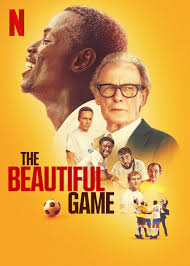
THE BEAUTIFUL GAME
UK, 2024, 125 minutes, Colour.
Bil Nighy, Micheal Ward, Valeria Golino,, Kit Young, Callum Scott Howells, Tom Vaughan Lawler, Leo Hamilton, Susan Warlomo, Christina Rodio.
Directed by Thea Sharrock.
Even though this is a soccer (football, a.k.a. in the UK, The Beautiful Game), it is much more than just a sports film – although fans will enjoy the different matches and the play.
But there is much, much more to the film then the soccer, essential though it is.
Did we know that since 2001 there has been the Homeless World Cup, where teams of homeless men and women representing their country train, have a coach, can apply to participate in the annual competition, a small group going to the host country, small sides, limited playing time, but a competition nonetheless?
Here the competition venue is Rome (always an attractive location). The focus is on a UK group, a group of men, though the American side is a team of women, coached by Mal, a thoughtful Bill Nighy, Nighy at his most likeable.. We learn the homeless stories, addiction, gambling, child neglect… But these men are on the moral mend, especially through the team.
The film has opened with children playing football, a young man watching them, joining in the kicking, but the audience suspecting that he has a chip on his shoulder. He is a bitter former professional, Vinnie (Micheal Ward), with emotional consequences. Mel watches him, invites him to join the group which he reluctantly does. He shows he has great skills, especially with his feet on the ball. However, his relationship with the rest of the men has very strong ups and downs.
Then, the team is ready, and off to Rome. Audiences who enjoy Rome will find plenty to their liking. (The screenplay has been written by Frank Cottrell Boyce (Dog Millionaire), a Catholic, often including Catholic themes in his films, like Millions about being a saint. He introduces some God talk, especially through one of the most exuberant characters in the film, a South African nun, the coach and sponsor of their team, delayed at passport control in South Africa because of visa problems for one of their members from Zimbabwe, but her persuading the official to let them arrive, arriving late, arranging a match with the English team, wearing her habit and veil, and gleefully calling on God for help!
The main teams we see are Japan, US, Italy and, as noted, South Africa. The matches have their excitement, the audience taking sides, especially when we realise that one of the English team is Syrian, a refugee barber, and the Italians have a hostile Syrian on their side. There is drama with the American team, a young woman determined to become a professional, the matches, some defeat, but a final reward for her.
In the meantime, Vinnie goes off by himself at times, refuses to share a room with one of his team who admires him, a former addict who lapses.
This is a very likeable film, and Mal is a very good man. There are some complications for Vinnie, his coping with his past, having to step up to some self-sacrifice – and finally, happily, learning why Mal has supported him so much.
A film of compassion blended with sports enthusiasm, an invitation to feel with others, hope for opportunities and second chances.
- The title, football, soccer, UK name, beautiful?
- The football audience, soccer audience, the other football codes? A sports Mfilm? More?
- The Homeless World Cup? Since 2001? Its scope? The teams, limits, the times for the matches? International? The players coming only one time in their lives? International perspective?
- The film and its outreach to the homeless, the reasons, addiction, neglecting children, gambling, thief? And the refugee barber from Syria?
- The International preparations, the focus on the UK, the team from Japan and the girl in charge, her age? The men, vagrants, the look? South Africa, the nun, boisterous leadership, the team? The US, Rosita and her ambitions?
- Gabriella, coordinator, knowing everyone, observations, comments, encouragement?
- Vinny, the introduction, with the children, playing, intervening, the criticisms? Mal Bradley observing him, intervening, praising him? Vinny, the loner, in his car, the courier jobs, not available, visit, child, wife, clashes? Is History of playing professionally? His bitterness? The challenge?
- Mal Bradley, his character, his years as a scout, his years with the Homeless team, bonding with each of them, encouraging, training them? The personal interactions with each?
- Vinny bitter, scoring goals, special technique, Cal and his skills, reactions, training together?
- The team, Nathan, simple and kind, revelation of his addiction, not able to be at home, the concern of his mother, the phone calls? Friendly with Vinny? Vinny not wanting to share the room with him, condemnation of Nathan as an addict, a loser? The effect on Nathan, the methadone treatment, neglecting it, having to go home, his apology to Vinny?
- Kevin, the background of his gambling? Jason, naivete, the attraction towards Rosita and their encounters? Cal, skills, the story of neglecting his son in the car? Aldar, the war in Syria, Kurds, refugee, barber? And his giving the haircuts to the team?
- The troubles, the spirit, the variety of teams? The South African team, held up with passport control, the introduction of sister, personality, the habit, boisterous, leading the team, prayer, God language? Insisting at the passport desk? The achievement, arriving in Rome, late for the match? Approaching Vinny, the agreement to the game? South Africa winning? The previous points for the UK because of their absence? The American team and their play?
- The visualising of the matches, the techniques, tactics, the scores?
- The spirit of the games, teamwork, opportunities, Rosita, her scholarship? The Italian team, the Syrian refugee, the final kicks, handshaking with Aldar? The Japanese loss, but the tour of Rome and their seeing beautiful things? Wanting one goal, getting more? The UK team and the visit to the Trevi fountain and tossing the coin, Mal and the memories of his wife and honeymoon?
- Vinny and the clashes, not sharing the room, by himself, the request to play for South Africa, his achievement, the medals? Alienation from the team?
- The ending, his arriving late, the reconciliation?
- Mal telling them to the truth about scouting him, and his reaction, happy to have been scouted by Mal?
- And the range of happy endings – touching the heart?
Ripley
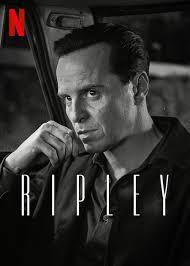
RIPLEY
US, 2023, 8X 56 minutes, black-and-white.
Andrew Scott, Dakota Fanning, Johnny Flynn, Margharita Buy, Kenneth Lonergan, Elliot Sumner, Maurizio Lombardi, Bokeem Woodbine, John Malkovich, Fisher Stevens.
Directed by Stephen Zaillian.
Tom Ripley is the literary creation by crime novel writer, Patricia Highsmith. Over the decades, he has had many incarnations, Alain Delon in the 1960s, Purple Noon, Dennis Hopper in the 1970s, The American Friend, strikingly in 2000, Matt Damon in The Talented Mr Ripley, John Malkovich in Ripley’s game, 2002. (Wikipedia indicates quite a number of other films, especially from the 1950s to the 1970s.)
This time he is played by Irish actor, Andrew Scott, completely convincing. And this time Dicky Greenleaf is played by Johnny Flynn and Marge by Dakota Fanning. There is a strong supporting cast of British, American and, especially, Italian actors.
It is a television series of eight episodes. This gives the screenplay enough time to offer sequences plenty of time to develop, sometimes giving the impression of events happening in real time.
But, one of the key assets for the film is its black-and-white photography, often described by reviewers and bloggers as “pristine” (clean and fresh as if new; spotless). Comments cannot do justice to the clarity of the black-and-white, some of the cities of Italy enhanced by the quality of the photography.
Tom Ripley is a conman. Tom Ripley is also a psychopath, not just a sociopath who can smile and charm but is self-absorbed, but is also criminally insane, and unscrupulous murderer. Every actor who plays Ripley has to be persuasive with charm but yet able to show the in the madness, the unscrupulous narcissism.
Ripley has offered the opportunity to go to Italy by wealthy American businessman, played by playwright Kenneth Lonergan, to persuade his son Dicky to come back to the US. Ripley takes the money, visits Dicky, sees the lifestyle, enviously and vicariously starts to live it, overcoming any suspicions by Dicky, but not by Marge. Which leads them to Ripley is murdering Dicky, covering the murder shrewdly, Tom becoming Dicky in the comfortable life in Rome, then in Venice. And, he is always one step ahead though there are many close calls.
The screenplay for this series has been written by veteran writer-director, Steven Zaillian, celebrated writer of many significant films from Schindler’s List, Gangs of New York, the Irishman.
- The work of Patricia Highsmith? The different versions of her Ripley stories?
- Ripley, a conman, psychopath, his success, an amoral character?
- The previous versions and comparisons? The value of the television series, eight episodes?
- The decision to film in black and white, the striking photography, “pristine”? Of the locations, towns, the beach, Naples, Rome, San Remo, Palermo, Venice? The musical score?
- The pacing with eight episodes, some action in real time, the strong attention to detail for developing the plot?
- The casting, Andrew Scott embodying Ripley?
- The introduction, New York City, the petty conman, his character, seeing him in action, the summons by Herbert Greenleaf, his wife, business interests, the proposal about his son? Ripley being tracked down by the private detective, the conversation? Explanations of Richard Greenleaf, Dickie and his leaving, settling in Italy? Ripley accepting the mission, the money, the travel to Italy?
- The town, Atrani, life there, the coast, Dickie, his age, lifestyle, wealth, relationship with his parents, alienation, dabbling in art? His relationship with Marge? Her writing a book? Her devotion to him? He to her? Is reading the manuscript and giving suggestions, her response? Ambiguous attitudes towards Tom?
- Tom, his arrival, ingratiating himself, his schemes, revelation of the truth about his mission, bonding with Dickie, not with Marge? Freddie and his visit, Tom’s dislike? The invitation to Cortina and its consequences? The lifestyle in the town, Tom, emulating Dickie, caught wearing his clothes and Dickie’s off-hand response?
- Tom writing to Herbert Greenleaf, money issues? The father and his letters, dismissing Tom, urging Dickie to be suspicious? The decision to go to San Remo, hiring the boat, Tom, calm, waiting for the moment, malevolent, killing Dickie, taking his ring, all the effort to come to shore, the body overboard, the rocks on the boat? The later recovery, the police investigations, the reports in the media?
- The details of Tom’s life, in the town, the various characters, learning Italian, the banks? The train rides? The hotels and reception? The feel of Italy in 1961?
- Tom, his skills at evading detection, going back to the town, Dickie’s clothes, typewriter? The smuggler and the previous proposition to smuggle, selling the boat? American Express in Rome? Tom becoming Dickie, his clothes, manner? Settling in Rome, expensive hotels?
- The various letters, the importance of the typewriter and its flawed letter e, Freddy’s visit, Tom and his coping, levels, the plan to kill him, the alcohol, the blood on the floor, taking the body, the elevator and its not working, dragging him down the steps, in the street, the car and his working out which one, holding him up, the witness walking his dog and the later visit to the police? The details of the drive, repeated several times, the via Appia, the taxi drivers, going back to retrieve the passport, his settling back at the apartment? Cleaning the blood? The importance of the landlady, her kindness to him, showing him the apartment, her receiving the police?
- Inspector Ravini, the visits, Tom and his calm during the interviews, the blood on the path? Marge, the visit, his meeting her in the cafe, her telling Ravini and his not believing her?
- The character of Ravini, the interviews, Tom on the edge, Max and his relationship with Freddie, wanting to meet Dickie? The media reports, suspicions on Tom? On the newspaper, the visualising of the articles, the pressure? Then on Dickie? The finding of the boat, the bank fraud and Tom fixing the signatures? The various phone calls from the bankers? Tom cashing the money? Getting the permission to go to Palermo
- The twist, Tom and the media and photos in Palermo, moving hotel? The decision to leave, the false clue about Tunis?
- Tom, in Venice, alive, revealing the visiting, Marge and her visit? The art world and the dealer? Marge intruding? Herbert Greenleaf arriving, the dangers, exposure, the private detective and his arrival, accusing Tom? The further discussions, speculation, the forged letters, the money to the landlady, the ring, the assumption that Dickie had killed himself?
- Tom, the art dealer, the Picasso, getting a new name and passport?
- Marge, publishing the book, the irony of Ravini seeing the photo of the actual Dickie?
After Death
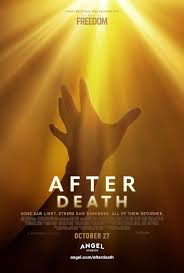
AFTER DEATH
US, 2023, 106 minutes, Colour.
Directed by Stephen Gray, Chris Radtke.
We have all heard or read about near death experiences. But, do we know what they really are, what they really mean? After Death begins with a definition – so, a review starting with some definitions.
Near-death experiences (NDEs) have been a source of controversy within academia and the public. NDEs occur in 10% to 20% of patients who have come close to death and consist of vivid, subjective experiences that occur during life-threatening emergencies. (Google definition)
A near-death experience (NDE) is a profound personal experience associated with death or impending death, which researchers describe as having similar characteristics. When positive, which the great majority are, such experiences may encompass a variety of sensations including detachment from the body, feelings of levitation, total serenity, security, warmth, joy, the experience of absolute dissolution, review of major life events, the presence of a light, and seeing dead relatives. When negative, such experiences may include sensations of anguish, distress, a void, devastation, and seeing hellish imagery. (Wikipedia definition)
Here is a documentary from Angel Studios, Distributors of Sound of Freedom, Cabrini, His Only Son, and for the television series, The Chosen. It is a documentary with many interviews. However, some of the interviewees have died and so an actor presents their opinions, audiences assuming that they are seeing the real person, especially Dr Michael Sabom. And, at the beginning, some of the death and neo-death experiences are dramatised, a plane crash, surgery, and, as the survivors of the experience tell their stories, these again are dramatised.
Very striking are the imaginative representations of the experience, cosmic, transcendent, colour, light and darkness, dramatic movement – a tribute to the special effects.
The film opens with the incidents and some interviews but raises issues of scientific verification, attempts at analysis, statistics, registration of near-death experiences.
There can be three main responses to all this material: favourable and accepting, an open-minded attempt at objective consideration, finally scepticism and hostility. After Death has been extraordinarily successful with audiences who are favourable and accepting, the responses on the Internet movie database, almost 200 blogs, are highly enthusiastic, some audiences seeing the film more than once, many overwhelmed by their experience.
Most of the experts, who have written books on the subject, some lecturing widely, describe the experiences in great detail, moving very much towards God language, some focusing on Jesus, and most speculating on what heaven is like or could be like. And, by the end, many of them are quite evangelistic and their enthusiasms.
On the other hand, some of the professional critics have been quite scathing and dismissive. They question the science. They are not impressed by the religious fervour. They consider all this a show.
Which means then that the film offers an opportunity for open audiences to listen to testimonies, to evaluate their credibility, to respond to their enthusiasm (or not). But, by the end, audiences will know that there are many experiences as people approach death, have experiences of being declared dead. But, as the film stresses, those who experience a near-death do not come back from the dead, as some seem to think, but they experience a resuscitation.
A film to challenge belief, scientific method, the reality of experiences which are beyond the normal.
